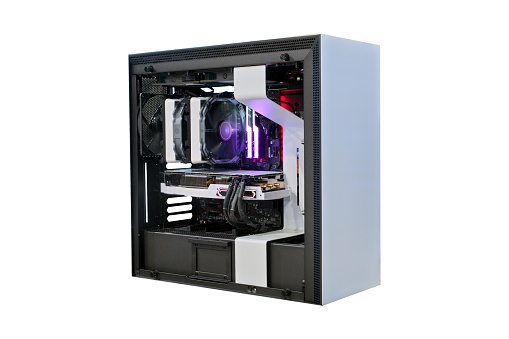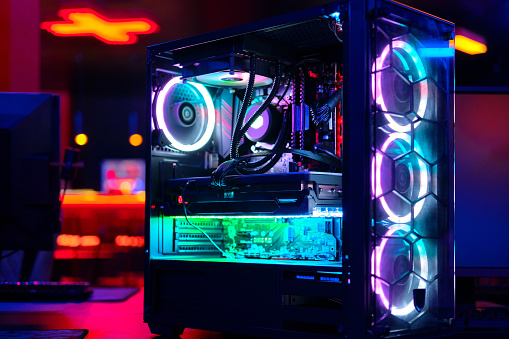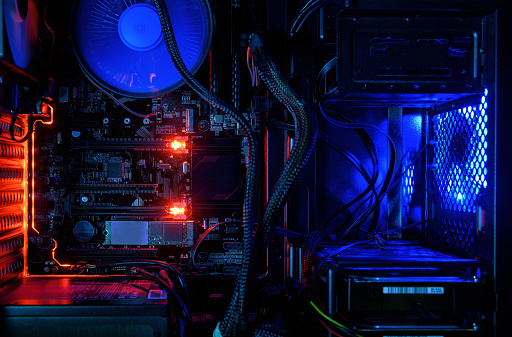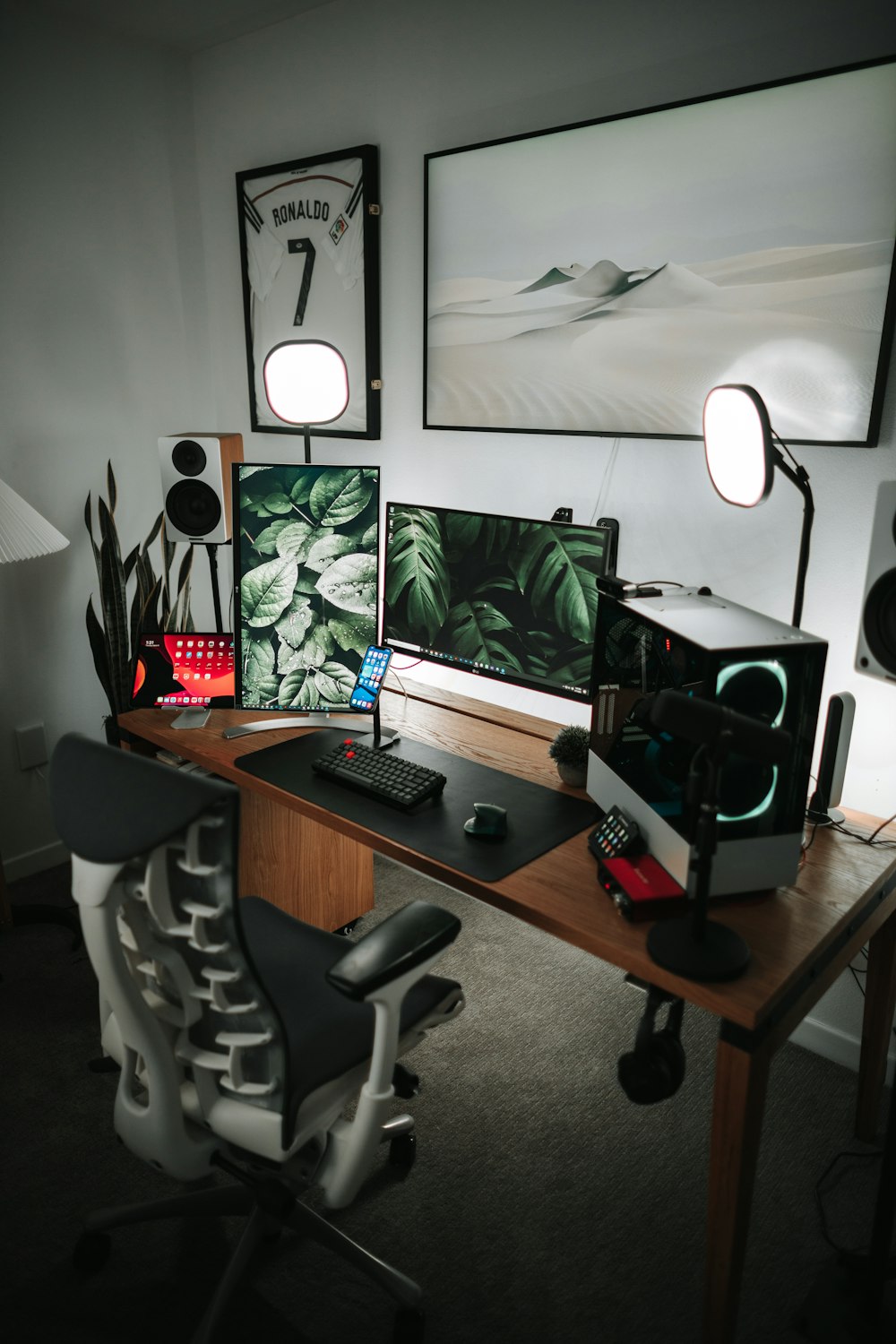
Depending on your gaming tastes and preferences, you might want to buy a different type of computer. Maybe you enjoy first-person shooters and would prefer to play them on a desktop rather than a laptop. What Size Tower to Buy for Your Gaming PC?
Exact sizing varies from case to case, but most mid-towers run up to roughly 18 inches high and 8 or so inches wide. Mid-tower PCs are probably the best for the gaming PCs
Or, maybe you want a computer that you can use for both gaming and other tasks, like word processing or watching videos online.
In either case, you’ll need to buy a new computer, whether you’re building a new gaming PC or replacing an old one.
The first step is determining whether you should buy a tower or a desk- or a micro-tower PC. Here’s what you need to know about computer tower size, along with some pros and cons of the different types of computers.

Related Article: How Much Space Do You Need for a Gaming PC?
What Size Gaming PC Do You Need?
Desktop PCs are typically the most expensive of the three computer types, and they include a tower. Tower PCs are designed to be put on your desk so you can easily access all its components.
The size of the tower varies depending on how much processing power it has. For example, a desktop with an Intel Core i3 processor should have a small tower that measures 6 x 17 inches.
On the other hand, a desktop with an Intel Core i7 processor should have a large tower that is about 24 x 20 inches in size. Desk- or micro-towers are for people who don’t want to worry about upgrading their computer every few years.
These computers have less space inside them, but they make up for it with lower prices and better cooling systems than tower PCs because they’re not open to the air like towers are.
Micro-towers usually come in one of two shapes: square or circular, and they can be placed on your desk next to your monitor or TV set.
Desktowers also come in different sizes based on what kind of PC you buy; some will have just enough space for your monitor and keyboard while others will have room for more components like your speakers and printer as well.
Laptops (or notebooks) are often cheaper than desktops because they use less electricity and parts than traditional desktops do.
The downside is that their graphics cards aren’t as good as those found in computers with graphics cards installed internally
What is a computer tower?
A tower computer is traditionally the largest type of desktop PC. Towers have a lot of processing power, and they can hold multiple hard drives and expansion cards.
This is perfect for gamers who need lots of space to store their games and other digital media. They’re also sturdy machines that can handle intense computing tasks, making them ideal for video editing and graphics design.
Pros: – Large tower cases offer ample room to store components – Lots of processing power – Sturdy (suitable for gaming or heavy design) Cons: – Tower cases are large and bulky, which might take up too much room on your desk – Certain components, such as power supplies, are not easily accessible in tower cases
Find the Right Size PC Tower for Your Gaming PC
It can be difficult to decide what size tower to buy, but it’s important to do your research. You want a computer that can accommodate the graphics card and other components.
If you’re building a new gaming PC, then you’ll need a tower with the right specs. If you’re replacing an old computer, then you should get a tower that matches the size of your current desktop or laptop.
The most important thing is to know how big your tower needs to be before buying anything. There are three different types of towers: desk-towers, mid-towers, and micro-towers.
Desk-towers are the largest size for towers and will hold any component that you might need for a gaming PC.
Mid-towers are slightly smaller than desk-towers and offer many of the same benefits as desks, although they may not have as much space for circuiting boards like power supplies or hard drives.
Micro-towers are also smaller than desk-tower PCs but have more room for circuit boards like power supplies and hard drives than mid-tower towers do.
Desk-Tower Pros: The biggest benefit of desk-tower PCs is that they have plenty of space where all the components can fit comfortably without any obstruction from one another or without having to use up too much space in your home or office.
Additionally, these computers usually come with their own built-in monitors which saves you money if you don

Is a mid tower case BIg enough for gaming?
A mid tower case is the perfect size for gaming. It’s significantly bigger than a desk- or micro-tower, but it’s still small enough to fit on your desk or in your entertainment center.
If you have an extra-large desk, you might want to consider getting a full tower instead of a mid tower, as they are much bigger.
Pros: *
- A mid tower case is the most versatile type of computer tower because it can be used for all sorts of tasks.
- If you don’t have a lot of space, a mid-tower case will give you plenty of room to grow.
- The cable management system on a mid-tower case makes it easier to organize your cables and keep them out of sight so they don’t get tangled up and messy.
Cons: *
- A mid tower is more expensive than desktop computers with similar specifications because it’s usually made from better materials and has more features.
- You might not be able to fit all the components inside of your computer when you buy one preassembled if you aren’t sure about what specs you want beforehand.
Does computer tower size matter?
The size of your computer tower is important because it will affect how much space you have for other peripherals, like hard drives or graphics cards.
If you choose to buy a desktop tower, you’ll need more room for all the components that go in it. You could measure the length and width of your desk to find out if there’s enough space.
If not, you might want to go with a micro-tower PC. They are smaller than towers and offer less of a gaming experience but can still be used for other purposes.
If you don’t have room for a desktop tower on your desk, then this might be a better option for you.
Is a bigger PC tower better?
There’s no one answer to that question. If you’re looking for a desktop PC, then it really is a matter of personal preference and what you need the computer to do.
Do you want a tower with a large screen? Maybe you want a PC tower with an extended monitor. Or are you going to be using your tower as your primary gaming device?
If that’s the case, then it would make sense to buy one of the larger towers available. The important thing is not to invest in something too big or too small for your needs.
You don’t want to be limited by your hardware or have excess space where you could have invested in better components for gaming or other tasks. So, before buying a computer, think about what size will work best for what you need from it.
Which PC Case Size is Best for Your Next Build?
Many people will start their build by deciding what type of case to buy. So, how do you choose? You’ll likely want to decide on a tower or desk- or micro-tower PC.
A desk- or micro-tower PC is often the best choice for a gamer who doesn’t want to play games in an office setting.
These computers are usually less expensive than towers and offer more room for upgrades and customizations.
Towers offer more space for parts and typically offer better cooling options. However, this comes with a higher price tag. A gaming tower is also likely your best option if you plan on playing games in an office setting.

Mid Tower vs Full Tower
A mid tower is a relatively small gaming computer that can easily fit on top of your desk. It’s often the best option for gamers who want to customize their builds, use taller GPU cards, or want more room for future upgrades.
If you want a larger, high-end gaming PC, you should consider a full tower. These towers are bigger and taller than mid towers and provide more space and better cooling for an overclocked system.
A full tower would be perfect if you have a video card with multiple fans or need extra clearance for future upgrades. There are also some drawbacks to these towers worth noting, as they take up more space and aren’t as easy to upgrade later on.
A tower case is big enough for gaming. Towers come in three different sizes, with mid-towers typically being the most popular. The size of the tower you buy will depend on your budget and how much space you have in your home to accommodate a tower PC.
If you want to buy a tower case, it’s best to measure the space that you have in your home and decide what size is best for you. If you buy a bigger case than you need, it’ll take up more space than necessary and might not fit into your desired location.
However, if you don’t get enough room for all of your components in a mid-tower case, then don’t worry; there are other options available.
You can choose from micro-tower cases or desk-tower cases that have more room for new components. You might also consider buying a laptop instead of a desktop computer if space is really an issue for you.
Laptops take up less space than towers and are less expensive than desktops as well (although they may not be able to run demanding games).
Why buy a gaming PC tower?
If you want the best gaming experience, a tower is what you need. With a tower, your desktop will be set up so it’s easier to see and use.
The tower also has more power than desktops with micro-towers or desktops and laptops. And let’s not forget about the size!
You can have a bigger and better monitor, which means you’ll be able to play games for hours without the screen going fuzzy or fuzzy around the edges.
Another pro: towers have more room for hardware upgrades. That means that if you buy a desktop tower now, but you decide later that you want to upgrade your graphics card, it won’t be an issue.
Smallest tower PC: The mini PC
Probably the smallest PC tower, a mini tower PC can be around 12 inches wide and 18 inches tall. These PCs have low power, usually comparable to a laptop in performance.
They are relatively lightweight, easy to carry and perfect for the person who only needs their computer for basic tasks like emailing or word processing.
Pros: The size of this type of PC means that it’s very easy to transport and you won’t need as much space to store it.
You can also buy an all-in-one monitor with a built-in digital TV tuner and DVD player, so you don’t need to worry about extra devices cluttering up your desk or living room.
This is also a good option if you don’t want to spend much money because they are less expensive than other tower PCs.
Cons: There are some drawbacks with these computers too, including lower quality sound and graphics due to smaller processors and video cards that come in these machines.
If you want more room on your desk or have limited space at home, this might not be the best option for you either.
Bigger tower PCs: Gaming and more
The tower PC is the best option if you want to game. Tower PCs are the most popular computer for gaming, and they also have very good processing power for other tasks (like loading web pages or videos quickly).
The desktop tower comes with a monitor that sits on top of it. Pros: -If you’re looking for a PC that’s mainly for gaming, this is probably the best choice.
The tower is also a great choice if you plan on using your PC to do other tasks (like word processing), because it has good processing power.
Cons: -If you don’t need a computer that’s mainly for gaming, you might be better off picking a laptop or micro tower PC. -Tower PCs can take up more space in your home office than desktops or laptops.
What do you need to know about tower PC sizes?
Tower PCs are the most common type of computer, and you’ll find that tower size is also associated with the amount of hard drive space. A tower PC will typically have a minimum of one terabyte, but some can have as much as six terabytes or more.
If you’re not sure how much hard drive space you need, you should plan on getting at least one terabyte. You’ll also need to consider the tower’s power supply. A power supply will either come with your tower PC or be an additional purchase.
This is important because a weak power supply may stop working after a few years and cause your computer to crash or become unusable.
If you want to build a gaming PC yourself, it’s best to buy a desktop tower instead of a laptop because it will have more space for powerful graphics cards and cooling fans.
As for desk-or micro-towers, these are smaller models that are great for those who don’t need lots of storage space or high-powered graphics cards.
These towers come with lower-powered processors and fewer ports than towers do, so they’re best for basic needs like word processing and web surfing.
What is the difference between a tower and a desk- or micro-tower PC?
The main difference between a tower and desk- or micro-tower PC is the size. Desk- or micro-tower PCs are smaller than towers and take up less space.
They’re also more affordable because they use fewer resources to power them. But desktops can only offer one graphics card, whereas towers can offer two graphics cards.
If you’re going to be playing graphics-heavy games like first-person shooters, then it’s worth investing in a tower PC, despite the higher cost.
A desk PC will also allow you to have more ports for other devices like printers, hard drives or speakers. If you’re looking for a gaming desktop that uses fewer resources and doesn’t need as much power, then you may want to consider buying a small desktop (desk or micro tower).
If you’re looking for a computer that does all sorts of things, including gaming and word processing, then you may want to consider buying a tower desktop instead.
FAQS
What is the difference between a tower and a desktop?
When you talk about a tower, you’re referring to a desktop computer. This type of computer sits on the floor and has many compartments for storing components. A desk- or micro-tower PC doesn’t have as many compartments for storing components, so it doesn’t require as much space.
Which PC tower size is best for gaming?
A tower that’s about 12 inches high, with a width of about 16 inches. – What are the pros and cons of buying an office tower instead of a desk or micro tower? You can get more RAM because the towers have more space. Plus, they often have more space for hard drives than desk- or micro-towers. If you want to also use your computer for tasks like word processing or video streaming, then a tower might be better suited for you.
Is there any downside to buying an office tower rather than a desk- or microtower?
It may take up too much space on your desk, but if you’re not concerned with that then go ahead and buy it!
What size tower to buy for your gaming PC?
There are many types of towers, but if you’re in the market for a new gaming PC, you should buy a desktop tower. They tend to be the most powerful and have the best graphics cards. A desk- or microtower computer is also great for gamers because it has enough power to handle games but doesn’t take up as much space on your desk
Conclusion
Buying a gaming PC tower is a big decision. You need to know the size of tower you need and which tower PC size is the best for your needs. If you are not sure which tower PC size is best for you, the first thing to do is to figure out what size gaming PC you need.
You can find the specifications for your gaming PC and tower PC on the manufacturer’s website. If you still can’t decide which tower PC size is right for you, there are also many accessories that can help with this decision.
Make sure to consider things like cooling, sound, space, and weight. The following are a few questions we get asked often about tower PC sizes: –
What is the difference between a tower and a desk- or micro-tower PC? – What size tower should I buy for my gaming PC? – How much space do I need for a tower PC?
What is the best option if I want to buy a new tower PC? – What do I need to know about tower PC sizes? – How do I measure the height of a computer tower? – What is the smallest tower PC available? – How
